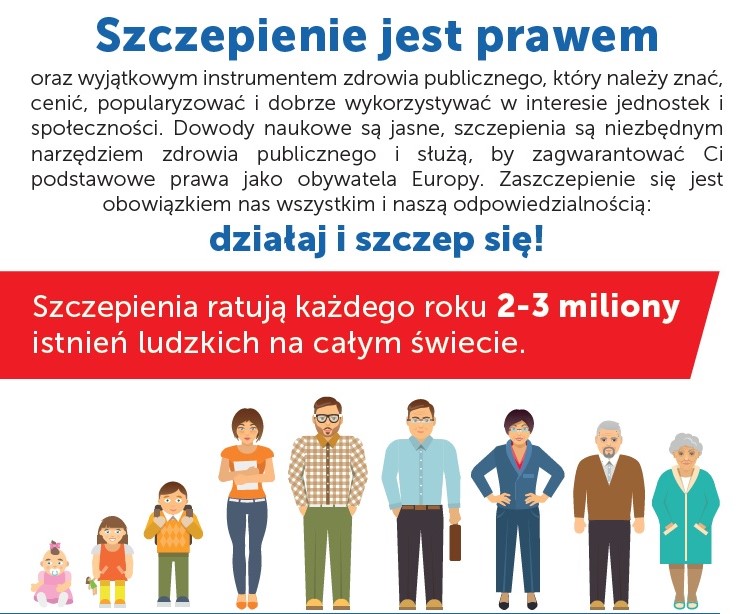European education campaign launched European Active Citizens for Vacation ("European Citizens Active on Vaccination - Raising Awareness in Europe of the Importance of Vaccination") . The campaign aims to raise awareness of the importance of vaccination and is run by the Active Citizenship Network in cooperation with partners in European Union countries such as Spain, Poland, Hungary, Ireland and Italy. In Poland, the Institute for Patient Rights and Health Education is the organiser of this campaign.
See the information brochure:
See spot:
Equal access to effective vaccination programmes should ensure that all citizens are able to live long and healthier lives regardless of gender, age and social groups. Responding to changes in the demographic structure of the EU population requires a change in national vaccination programmes to implement a lifelong vaccination policy.Most programmes and campaigns focus on promoting vaccination among children, but increasingly experts are emphasising the role that vaccination can also play among adults, especially those over 60 years of age. We are living longer and longer, more and more people are suffering from diseases of civilisation that weaken immunity to viral infections, and we are also increasingly doing work that may expose us more to dangerous viruses or bacteria (e.g. travel, contact with large numbers of people).This approach is particularly important for European countries, where the proportion of older people is increasing and keeping this group of people healthy and active is becoming a very important priority for governments. With age, the risk of vaccine-preventable diseases such as pneumococcal disease, hemiplegia and influenza increases. Vaccination across the lifespan enables adults to age with a reduced risk of vaccine-preventable diseases.Currently, however, most vaccination programmes still focus on rigidly defined life stages such as childhood, whereas scientific evidence increasingly argues for a life-cycle vaccination strategy, an approach in which vaccinations are given at all stages of life. Such a strategy recognises the role of vaccination as a strategy to prevent disease and maximise health across the lifespan, irrespective of a person's age.The World Health Organisation (WHO) recommends a life-cycle approach as a model of health care delivery that would benefit both individuals and health systems. This approach requires that vaccination calendars and access to vaccination should correspond to a person's life stage, lifestyle and the specific infectious disease risks they may face.There is now a move away from traditional strategies in which vaccines are developed and administered in response to an immediate threat to particular age groups. Instead, investment in vaccination strategies should be based on their potential to enhance the ability to maintain good health over the course of each person's life and their impact on preventing other pathogens and co-morbidities over time.
Vaccination is one of the most important medical achievements, as well as a right and a unique public health instrument that should be put to good use in the interests of both individuals and entire communities.
A recent study says that the effectiveness of the implementation of life-cycle vaccination strategies depends mainly on elements such as a comprehensive vaccination programme that supports the availability of vaccines, awareness of the need for vaccination among the public, committed health care workers, robust data to support strategies and programmes.The vaccination calendar should be comprehensive and cover all persons at risk of contracting or further transmitting infectious diseases, incorporate comprehensive guidelines that take into account vaccination in different vulnerable populations.National health policies in the context of ageing in some countries recognise vaccination as an important strategy to achieve their goals.

